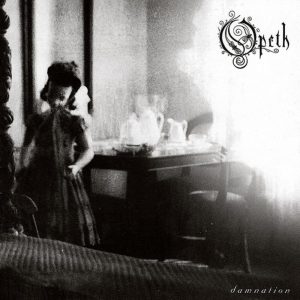Opeth Damnation Review
General Information:
Artist: Opeth
Album: Damnation
Genre(s): Rock
Subgenres(s): Progressive Rock, Soft Rock
Released: 2003
Length: 43 minutes
Language(s): English
Label(s): Music for Nations, Koch Records
Track List:
01. Windowpane
02. In My Time of Need
03. Death Whispered a Lullaby
04. Closure
05. Hope Leaves
06. To Rid the Disease
07. Ending Credits
08. Weakness
Opeth Damnation Review
Damnation is the seventh studio album by Swedish band Opeth. Unlike all of their previous albums, Damnation sees the band shedding themselves of their renowned death metal, progressive metal, folk and acoustic music blend for a hybrid of progressive and soft rock. The album is soft to the point that at times it can be seen as pushing the boundaries of what can be considered rock music, progressive influences or not.
Windowpane sets the tone perfectly with a sound crafted around a central clean-sounding guitar melody that interplays with an acoustic guitar and a steady rock drum beat devoid of metal tempos that give room for the prevailing melancholic mood to take hold. This is further enhanced by the keyboards and is indicative of what Damnation is about. Fans hearing this for the first time, and being familiar with their previous output, will be anticipating the sudden transition to Opeth’s metal sound but that moment will never come. On top of this, vocalist and guitarist Mikael Akerfeldt has also left his death growls in favour of a restrained singing voice that sounds fragile at times. While some fans will have undoubtedly being disappointed by these drastic changes, it would have also been impossible to fit that aggressive vocal style into Damnation and make it work.
The melancholic mood is a central theme to Damnation and in some ways this helps to paint the album as a by the numbers effort. This is due to the songs, at times, blurring together and losing their distinctive nature when listening from start to finish. Two of the biggest standouts are the minimalist Weakness, which is centred on a subtle keyboard arrangement and is entirely devoid of percussion. Closure, the only song that shakes of the passive sound thoroughly, actively engages the listener in a different way. The tempo picks up as the song progresses and Opeth pushes it even further towards the end to create a total cacophony when put next to the rest of the album. This abruptly cuts out and if you had downloaded this song through one of the illegal file sharing services around at the time Damnation was released you would have thought that the song had been corrupted or was incomplete. This leads directly into Hope Leaves and makes these songs contrast in a way that can be seen an intentional throwback to their previous albums where the acoustic and metal parts can come right after each other. This way of integrating that aspect of Opeth’s character into Damnation is not as well executed as desired, if that is the case, since it is more disjointed than fluid in its delivery.
It’s difficult for any band to break away from their established sound to explore new ideas but Opeth embrace their progressive rock influences honestly and passionately. This combined with the efforts of co-producer Steven Wilson (Porcupine Tree) on the keyboard and piano rounds off their sound and helped them to realise their vision. Damnation is an important milestone in Opeth’s history and is recommendable to anyone wanting to experience the softer side of rock music.
Performers:
Mikael Akerfeldt: Vocals and lead guitar
Peter Lingren: Rhythm guitar
Martin Mendez: Bass guitar
Martin Lopez: Drums
Additional Performers:
Steven Wilson: Keyboards, piano, Mellotron, backing vocals
